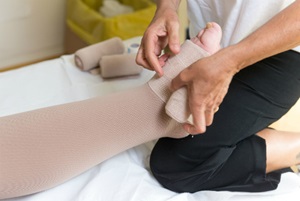Leg Swelling
The University of Maryland's Center for Leg Swelling offers patients with leg swelling a thorough physical assessment, state-of-the-art diagnostics and the latest advancements in the treatment of leg swelling.
Our multidisciplinary staff includes vascular, cardiovascular and hematologic expertise.
We are committed to providing comprehensive care that not only can improve patient symptoms, but also determines the etiology of the problem.
After a few focused assessments, we can narrow down the cause of your leg swelling and gear your treatment towards the most likely intervention to improve symptoms.
Leg Swelling is Common
If you are suffering from leg swelling, you are not alone. According to the 2000 U.S. Census Bureau report, 4.4 million people each year in the United States complain of leg swelling, making it one of the country's most common health problems.
Leg swelling is caused by excess fluid retention in the lower extremity tissues. Fluid that normally should be in the circulatory system gets out into the muscle and soft tissue of the leg and can accumulate. The medical term for this is peripheral edema.
When pressure from a shoe, sock or examining finger can leave a temporary indentation in the skin, this is known as pitting edema.
Symptoms of Leg Swelling
Symptoms often associated with leg swelling include:
 Leg pain
Leg pain- Numbness
- Redness or other discoloration
- Rash
- Itching
- Ulceration
- Palpitations
- Shortness of breath
One or both legs can be affected. Leg swelling can occur suddenly or develop slowly.
Once recognized, it is important to seek urgent medical care. If left untreated, leg swelling can lead to associated infections, wounds and the development of permanent swelling.
Any leg swelling associated with chest pain, dizziness, breathing difficulty or confusion warrants an emergency medical evaluation.
What Causes the Swelling?
The causes of leg swelling include health problems affecting organs such as the heart, kidneys, thyroid and liver. Leg swelling can indicate a problem with the circulatory system. In these cases, patients presenting with leg swelling can have a problem with the arteries, veins, lymphatic drainage and/or clotting system.
Often, obesity plays a role in the patient’s symptoms. Being overweight puts pressure on the circulatory system trying to drain the lower extremities and essentially can obstruct blood flow back to the heart. Swelling in the legs can also be worsened by a chronic injury which leads to inflammation over time.
Untreated and aggravated orthopedic issues like fractures or sprains, arthritis, blood clots, chronic infections and gout can result in inflammation and leg swelling. More rare causes of leg swelling include medications, congenital malformations and cancers.
Treatments for Leg Swelling
Treatment modalities offered, in addition to treating the underlying cause where applicable, include but are not limited to:
- Lifestyle modifications
- Compression therapy
- Sclerotherapy
- Venous ablation
- Endovascular therapy with angioplasty and stent placement
- Anticoagulation
- Lymphedema pump therapy and massage
- Heart failure treatment
- Bariatric surgery referral
Some treatments, such as sclerotherapy, can be performed in the office setting. Many of our therapies are minimally invasive, giving patients the opportunity to recover faster with smaller surgical incisions.
Most treatments, if surgical, are outpatient interventions, enabling the patient to go home the same day. Often, treatments can be done through small needles, wires and catheters that provide patients precise and long-lasting results. Gone are the days of long procedures and recovery times with large, painful incisions.
Leg swelling does not have to be a lifelong problem. If you are suffering from leg swelling, please call 410-328-5840 to make an appointment.
